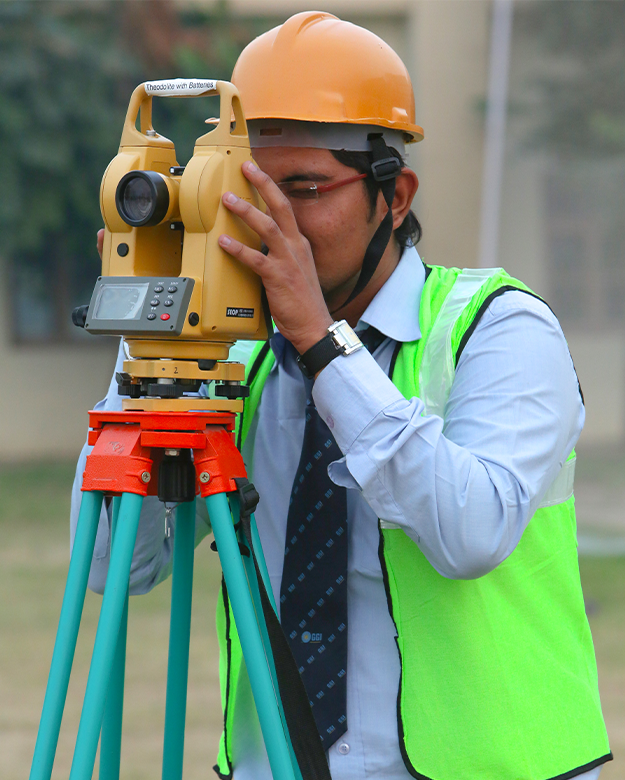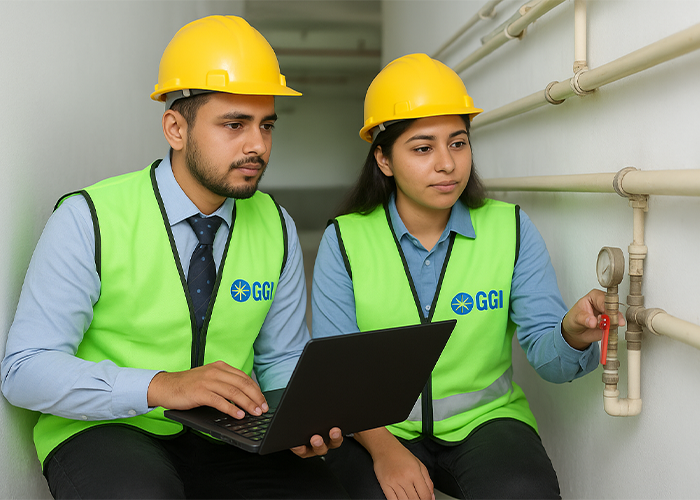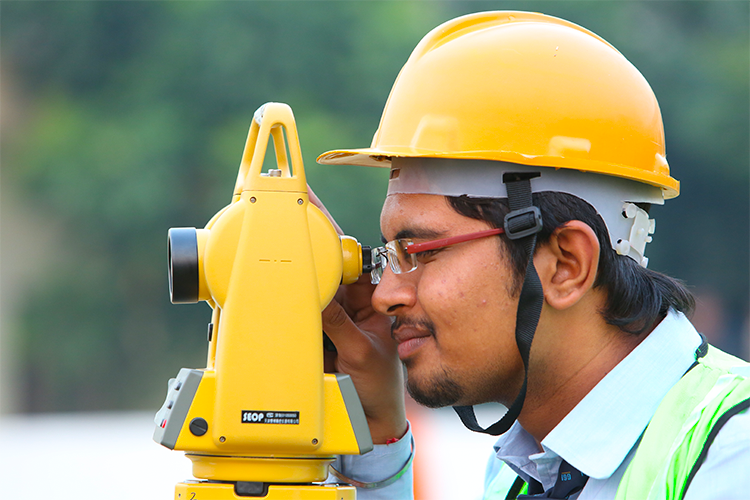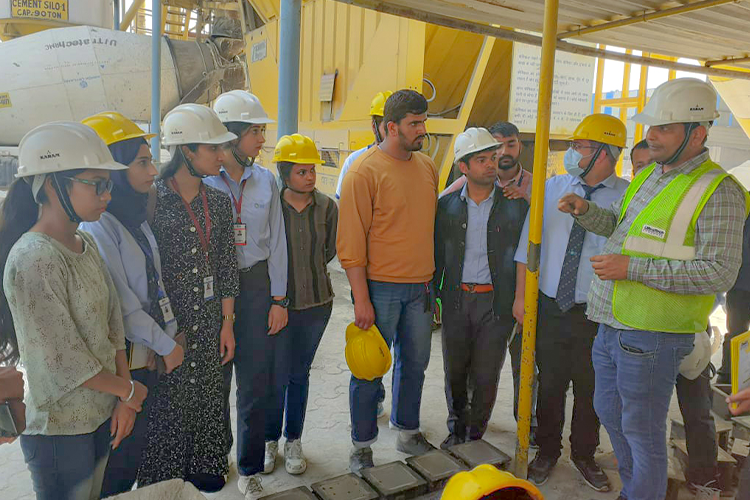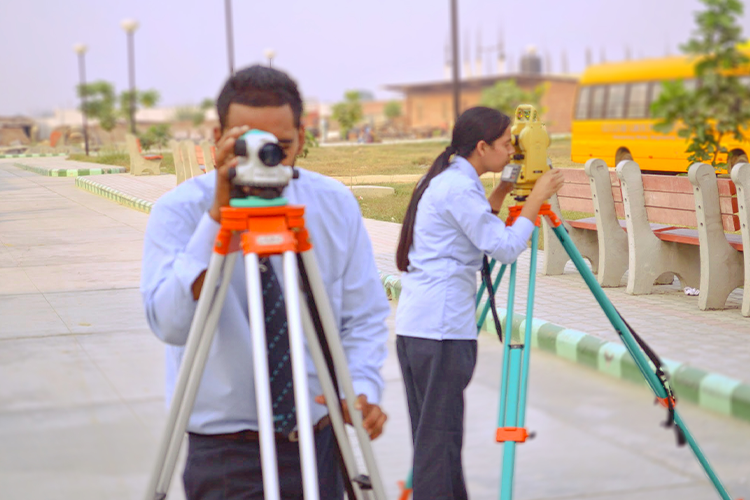Course Structure
The B.Tech(Civil Engineering) program at Gulzar Group of Institutions offers a comprehensive curriculum spanning eight semesters.
Engineering Mathematics is a foundational course that provides students with essential mathematical concepts and techniques relevant to engineering applications. Topics covered include calculus, differential equations, linear algebra, and more.
Basic Electronics covers essential principles of electronic circuits, including the operation and characteristics of diodes, transistors, and operational amplifiers, as well as the analysis and design of simple circuits and systems.
Engineering Drawing covers technical drawing principles and techniques, including geometric construction, orthographic projections, isometric views, sectional views, and dimensioning. These skills are essential for creating and interpreting engineering drawings and blueprints.
Mathematics – II delves into advanced calculus, linear algebra, and differential equations, covering topics like multiple integrals, vector calculus, eigenvalues and eigenvectors, and their applications in solving engineering problems.
Engineering Mechanics deals with the principles of mechanics applied to solve engineering problems. It includes statics, dynamics, and mechanics of materials, focusing on forces, equilibrium, motion, and structural analysis in engineering applications.
Physics – II covers advanced topics in physics, including electromagnetism, optics, quantum mechanics, and thermodynamics. It builds upon foundational concepts to delve deeper into the principles governing the behaviour of matter and energy in various physical systems.
Introduction to Computing covers topics such as programming fundamentals, algorithms, data structures, and computational thinking. Students learn essential skills for software development and problem-solving in diverse applications.
In the Physics Laboratory, students typically conduct experiments to reinforce theoretical concepts learned in physics lectures. This hands-on experience helps in understanding fundamental principles through practical application and data analysis.
Mathematics-III typically covers advanced topics in mathematics relevant to engineering disciplines, including differential equations, vector calculus, complex numbers, and numerical methods. This course builds upon foundational mathematical concepts introduced in earlier semesters.
Solid Mechanics is essential in Civil Engineering, covering stress and strain analysis, material properties, beam bending, torsion, and structural deflection, critical for designing safe and efficient civil infrastructure and projects.
Civil Engineering Materials encompasses the study of materials used in construction, including concrete, asphalt, metals, and composites. It covers their properties, testing methods, durability, and sustainability, crucial for designing resilient and eco-friendly infrastructure.
Fluid Mechanics studies the behaviour of fluids at rest and in motion, covering properties, statics, dynamics, flow measurements, and engineering applications. It’s essential for designing hydraulic systems, pipelines, and aerodynamic structures.
Engineering Geology applies geological principles to civil engineering projects, focusing on the analysis of soil and rock mechanics, site investigation, and assessing geological hazards to ensure safe and sustainable construction practices.
The Civil Engineering Materials Laboratory provides hands-on experience in testing and analysing construction materials such as concrete, steel, and asphalt, helping students understand their properties, behaviour, and suitability for various engineering applications.
The Fluid Mechanics Laboratory offers practical experience in analysing fluid behaviour through experiments on flow measurement, fluid properties, and hydraulic machinery, helping students understand the principles and applications of fluid mechanics in engineering.
Structural Analysis – I involve studying the principles and methods for analysing the behaviour of various types of structures under different loads, preparing students to understand the structural integrity and stability in civil engineering designs.
Surveying introduces techniques for measuring and mapping land, including the use of tools like theodolites, total stations, and GPS. It covers topics such as distance measurement, levelling, and angle measurement, essential for civil engineering projects.
Geotechnical Engineering-I covers soil mechanics principles, including soil properties, classification, compaction, and shear strength, crucial for foundation design and various civil engineering applications. It emphasises soil behaviour under different conditions.
Environmental Engineering-I introduces the principles of environmental science and engineering, focusing on water and wastewater treatment, air pollution control, and solid waste management. It covers the design and operation of treatment processes and pollution control systems.
Hydraulics and Hydraulic Structures explores fluid mechanics principles in designing hydraulic systems, covering flow in open channels, pipe networks, hydraulic machinery, and the design of dams, spillways, and other hydraulic structures.
Structural Analysis II delves into advanced methods for analysing structures, including indeterminate structures, matrix methods, influence lines, and stability analysis, essential for understanding complex load-bearing behaviour in civil engineering projects.
Reinforced Concrete Design covers the principles of designing concrete structures reinforced with steel, focusing on concepts such as bending, shear, bond, and anchorage, ensuring the durability and safety of civil engineering constructions.
Geotechnical Engineering II delves into advanced topics such as soil stabilisation, foundation design, slope stability analysis, and underground construction methods, crucial for safe and sustainable civil engineering projects.
Transportation Engineering I focuses on principles of transportation planning and design, traffic flow theory, highway geometric design, and pavement materials, essential for efficient and safe transportation infrastructure development.
Geotechnical Engineering II delves into advanced topics such as soil stabilisation, foundation design, slope stability analysis, and underground construction methods, crucial for safe and sustainable civil engineering projects.
Construction Technology and Management covers advanced techniques in construction, project management, and sustainable practices. It includes topics like materials, methods, cost estimation, scheduling, quality control, and safety management for efficient project execution.
Design of Steel Structures involves the analysis and design of structural steel elements and systems for buildings and bridges. It covers topics such as load calculations, steel member design, connections, and detailing according to relevant codes and standards.
Transportation Engineering II focuses on advanced topics in transportation systems, including traffic engineering, transportation planning, highway geometric design, pavement design, and public transportation systems. It explores sustainable and efficient solutions for modern transportation challenges.
Engineering Hydrology involves the study of water resources, precipitation, evaporation, runoff, groundwater, and their interaction with the environment. It applies hydrological principles to engineering practices, including flood control, water resource management, and environmental protection.
The Hydrology Laboratory offers practical experience in measuring hydrological parameters like precipitation, evaporation, and runoff. Students use instruments and models to analyse water behaviour in diverse environmental settings.
The Design Project allows students to apply theoretical knowledge to real-world engineering problems. Working in teams, they develop innovative solutions, prepare detailed reports, and present their projects, gaining valuable practical experience.
Departmental Elective – II offers students the opportunity to specialise in a specific area of civil engineering, allowing them to tailor their education to their interests and career goals through advanced coursework.
Departmental Elective III allows students to further deepen their expertise in a chosen area of civil engineering, providing advanced knowledge and skills to enhance their professional development and career opportunities.
B.Tech Project – I involves the initiation of a significant research or design project, where students apply theoretical knowledge and practical skills to solve real-world engineering problems under the guidance of faculty mentors.
Open Elective-I allows students to choose a course outside their core curriculum, broadening their knowledge and skills in diverse fields and fostering interdisciplinary learning and personal interests.
Industrial and Software Training equips students with hands-on experience in industry practices and proficiency in essential engineering software, preparing them for real-world challenges.






































